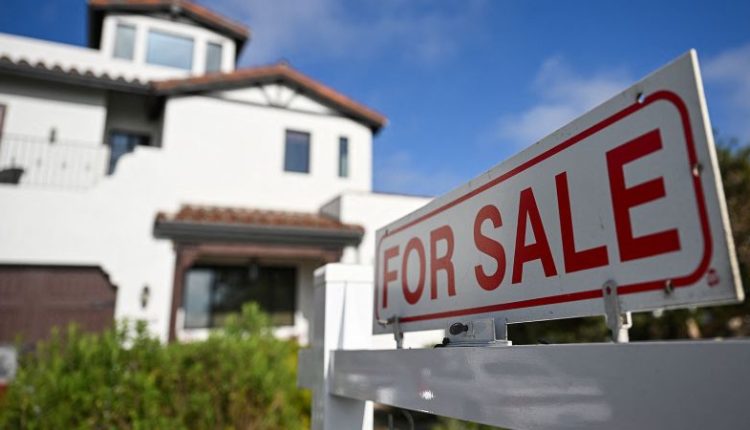On Wednesday, the Federal Reserve is widely expected to cut interest rates after keeping them at a 23-year high for more than a year, fueling hopes that America’s sluggish housing market might soon turn a corner.
Mortgage rates have doubled since 2020, contributing to one of the most unaffordable housing markets in history. While the Fed doesn’t directly set mortgage rates, its actions affect borrowing costs throughout the economy.
The most apparent effect: An interest rate cut could help ease the upward pressure on mortgage rates, making one piece of the homebuying equation more affordable. That could be good news for first-time homebuyers and existing homeowners who have been hesitant to put their houses up for sale in a higher interest-rate environment. It could also spell fiercer competition among homebuyers, though.
In fact, mortgage rates have already begun steadily falling in anticipation of the Fed’s expected Wednesday cut. According to Freddie Mac, the average 30-year fixed mortgage rate fell to 6.20% last week — the lowest level since February 2023, and down significantly from last year’s peak of 7.79%.
A single percentage point change in mortgage rates may not seem like a lot, but it can save homebuyers hundreds of dollars in monthly payments.
Consider as an example a home sold for $422,600, the median sales price of a home in the US according to the National Association of Realtors. Assuming the buyer put down a 20% deposit at closing and has a standard 30-year fixed mortgage rate, that buyer could save more than $2,600 per year on interest payments if they lock in a 6% mortgage rate compared to 7%.
Supply has been another key factor contributing to housing market difficulties: Homeowners who locked in ultra-low pandemic-era mortgage rates were less willing to sell their homes. That has created more fierce competition, often leading to bidding wars for existing homes on the market.
Falling rates may finally break that mortgage “lock-in” effect.
“There are homeowners who would have liked to sell already but didn’t because they couldn’t afford their next mortgage given how high rates are,” said Daryl Fairweather, Redfin’s chief economist. “The more that rates come down, the more feasible it is for those people to sell their homes and buy again.”
That said, it’s highly unlikely that mortgage rates will fall back down to where they were in the early days of the pandemic when the Fed slashed interest rates in an emergency move to buoy the economy, Fairweather said.
Most investors are betting that the Fed will cut its benchmark interest rate by just a quarter-point on Wednesday. While future cuts are expected, there’s no guarantee when they will happen.
“A lot of people locked in mortgage rates at around 3%. We’re not getting back down that low,” she said.
Indeed, Wells Fargo estimates the 30-year fixed mortgage rate will average 6.5% by the end of 2024 and 5.9% by the end of 2025.
If you bought a home in 2022 or 2023, the prospect of refinancing your mortgage might seem appealing as rates fall. Some financial advisers counsel to wait until you can get a mortgage rate that is a full percentage point below the rate you’re already paying, said Fairweather.
“If you got a 7.5% mortgage rate, you may already be in the money to refinance,” she said. “If I were in the position of somebody who got a really high rate, I would probably wait to see where rates are headed.”
If you’re a potential homebuyer itching to come off the sidelines, however, a further drop in mortgage rates may end up being a double-edged sword.
While lower rates could give homebuyers more purchasing power, they could also lead to more intense competition for homes on the market, driving record-high home prices even higher.
“It’s one of those things where you should be careful what you wish for,” said Greg McBride, the chief financial analyst at Bankrate. “A further drop in mortgage rates could bring a surge of demand that makes it tougher to actually buy a house.”
Another factor that may eventually increase demand is the recent rule changes by the National Association of Realtors.
The changes, which went into effect on August 17, are designed to shift the way the 1.5 million NAR real estate professionals are paid when they help people buy and sell homes.
“It’s been a little bit difficult to navigate the housing market right now because of that rule change,” said Fairweather. “I think a lot of buyers are waiting until next year to jump in.”
Overall, it’s tough to perfectly time the housing market, though speaking to several mortgage lenders to compare their rates can help you secure a lower rate.
While falling mortgage rates may make the prospect of buying a home more appealing to some, it shouldn’t be the sole deciding factor, said Leo Pareja, the CEO of eXp Realty, one of the largest real estate brokerages in the US.
“I always tell people, lock in what you can afford,” said Pareja. “Your home is where you raise your family. It’s your lifestyle, proximity to activities, to school and all these different ingredients. It’s not just a return on investment.”
Read the full article here

